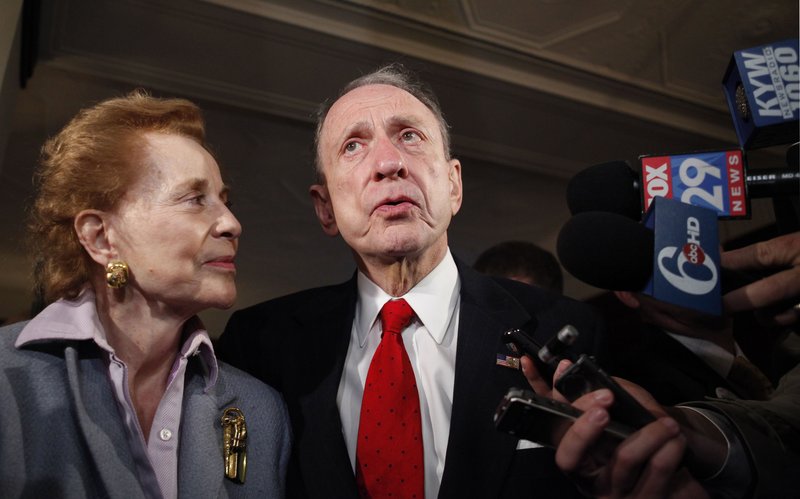WASHINGTON – Veteran Sen. Arlen Specter of Pennsylvania, who switched parties hoping to prolong his career, lost his bid for a sixth term Tuesday night at the hands of impatient Democratic primary voters rejecting his plea to reward experience. Political novice Rand Paul rode support from tea party activists to a rout in Kentucky’s Republican Senate primary.
In another race with national significance, Democrat Mark Critz won a special House election to fill out the term of the late Democratic Rep. John Murtha in southwestern Pennsylvania. Both political parties spent roughly $1 million to sway the outcome, and highlighted the contest as a possible bellwether for the fall.
On the busiest night of the primary season to date, Arkansas Democratic Sen. Blanche Lincoln led in her bid for nomination to a third term but was forced into a potentially debilitating runoff on June 8 against Lt. Gov. Bill Halter.
Taken together, the results were indisputably unkind to the political establishments of both parties. But any attempt to read into the results a probable trend for the fall campaign was hazardous — particularly given Critz’s victory over Republican Tim Burns to succeed Murtha in Congress.
Specter fell to two-term Rep. Joe Sestak, who spent 30 years in the Navy before entering politics. Sestak was winning 54 percent of the vote to 46 percent for Specter. He told cheering supporters his triumph marked a “win for the people over the establishment, over the status quo, even over Washington, D.C.”
Sestak’s campaign calling card was a television commercial that showed former President George W. Bush saying he could count on Specter, then a Republican, and then had Specter saying he had switched parties so he could win re-election. Once unleashed, it coincided with a steady decline in Specter’s early lead in the polls, and signaled the end of the political line for the most durable politician of his generation in Pennsylvania.
Former Rep. Pat Toomey won the Republican nomination and will run against Sestak in the fall in what is likely to be one of the marquee races in the battle for control of the Senate.
Paul’s victory was certain to add Kentucky to that list.
“I have a message, a message from the tea party, a message that is loud and clear and does not mince words: We have come to take our government back,” said the eye surgeon, who was making his first run for office.
But the same energy that helped Paul, 47, to victory presented problems to be handled carefully by the Republicans in the run-up to November, when control of both houses of Congress will be at stake.
Paul has said he might not support his fellow Kentuckian, McConnell, for a new term as party leader. And no sooner had Tuesday’s results been posted than Richard Viguerie, a longtime conservative warrior, suggested McConnell step aside.
The far-flung races took place a little less than five months before the midterm elections. President Obama backed incumbents in his party’s races, but despite the stakes for his legislative agenda the White House insisted he was not following the results very closely.
Whatever the fate of the parties, public opinion polls — and the defeat of two veteran lawmakers in earlier contests — already had turned the campaign into a year of living dangerously for incumbents.
High unemployment, an economy just now emerging from the worst recession in generations and Congress’ decision to bail out Wall Street giants in 2008 all added to voters’ unease, polls said.
In a survey released shortly before the polls closed, ABC said voter expectations for the economy had turned optimistic for the first time in six years. At that, only 33 percent of those polled said so in the network’s polling, compared with 29 percent saying the opposite.
Send questions/comments to the editors.



Success. Please wait for the page to reload. If the page does not reload within 5 seconds, please refresh the page.
Enter your email and password to access comments.
Hi, to comment on stories you must . This profile is in addition to your subscription and website login.
Already have a commenting profile? .
Invalid username/password.
Please check your email to confirm and complete your registration.
Only subscribers are eligible to post comments. Please subscribe or login first for digital access. Here’s why.
Use the form below to reset your password. When you've submitted your account email, we will send an email with a reset code.